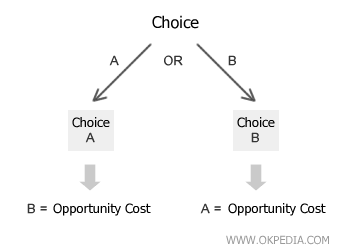Opportunity Cost
Opportunity cost is the trade-off an economic agent faces when making a choice. It represents the value of the alternative that is given up when one option is chosen over another. Every decision involves selecting from various possibilities, and with each choice, something else must be sacrificed.
For instance, when someone starts working, they forgo some of their free time to earn an income. In this case, free time is the opportunity cost of that decision.
Opportunity cost reflects the value of goods or services that are forgone when an economic agent opts for one option over another, whether it’s a different good or service.

The concept of opportunity cost is rooted in the same principle that underpins economic goods: scarcity of resources. In a world of limited resources, every economic agent must make choices to meet their needs through production and trade, allocating limited resources (trade-offs) to maximize utility. When someone chooses to purchase a good, they use part of their wealth, which means they are also giving up the ability to buy other goods or services. Every economic decision involves some form of sacrifice.
For example, if someone doesn't have enough money to buy both product A and product B, they must choose one (e.g., product A). By doing so, they sacrifice the benefit they could have gained from purchasing product B. The cost of giving up that alternative is the opportunity cost.
Opportunity Cost in Production
In production, the opportunity cost of using resources is based on their most profitable alternative use, which may differ from the historical cost, or the amount originally paid for the good, service, or resource. Opportunity cost takes into account the potential alternatives that are forgone during the production process.
For example, a company may have to decide whether to use its resources to manufacture cars or invest in real estate. If the company chooses to produce cars, the opportunity cost is the profit it could have made by investing in real estate. This cost can be higher or lower depending on the potential returns of the alternative investment.
Opportunity cost is closely tied to economic decision-making and resource allocation. When resources are directed toward one specific use, other potential opportunities are given up, and that lost opportunity is what constitutes the opportunity cost.
Opportunity Cost in Public Sector Decisions
Opportunity cost is an important concept in public economics, where it is used to assess the value of alternative investments.
For example, if a policy maker chooses to fund the construction of a new road, they may have to forgo building new schools due to limited budget resources.
Opportunity cost helps evaluate decisions in situations where the monetary value of goods and services cannot be easily quantified, providing an essential tool for cost-benefit analysis in the public sector.
